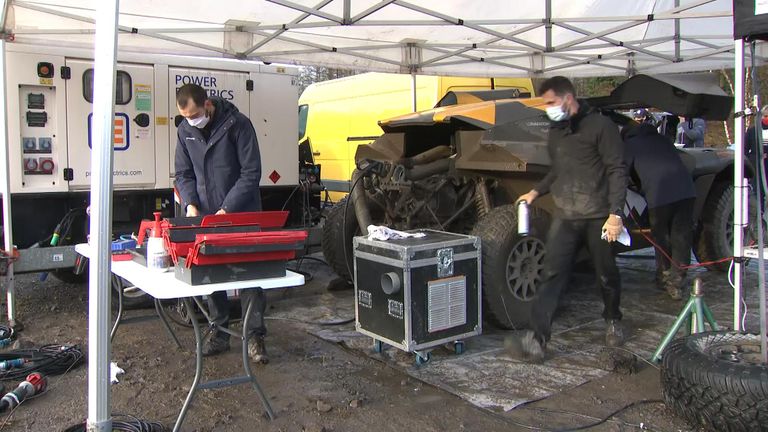Formula 1 world champion Jenson Button has spent two days in the Welsh Valleys test driving a 100% electric SUV, ahead of a new rally series aimed at highlighting climate change.
The racing driver - originally from Somerset but now living in California - spoke to Sky News on a forest test track in South Wales.
He will drive the 550 horse-power electric SUV in the Extreme-E race event starting in April and said he is looking forward to learning about environmental challenges in some of the world's most remote areas.

Image:Button has spent two days test driving a 100% electric SUV
The 41-year-old will lead one of 10 teams set to race in Saudi Arabia, Argentina, Greenland, Brazil and Senegal this year.
"We're racing in five different locations around the world - all locations that have been affected by climate change and it's about bringing awareness," said Button.
"There are a lot of personalities in the sport in terms of the drivers and also the team owners. Nico Rosberg's got a team, Lewis Hamilton's got a team, Ganassi from the States - there are some big teams racing and this brings a lot of awareness to those areas we're racing in," he added.
Scientists from the universities of Oxford and Cambridge will join the race to carry out experiments in locations including glaciers in Patagonia and Amazonian rainforests.
The teams will all race the same electric SUV, which was developed in France by electric racing car developer Spark.
The car, known as the Odyssey 21, can reach 62mph in 4.5 seconds - but at 1.6 tonnes, it weighs more than double an F1 car.
It will be charged using hydrogen fuel, generated from water and solar energy.
Button said: "It's weird to call it a car - because it goes off-road, over big jumps, goes through anything basically - it's more of a buggy. It's all electric, all-wheel drive and, as I've found in the last day or so, it's a lot of fun."
Despite the cars being electric, deploying a 10-team professional rally series into five of the most remote areas of world carries a hefty carbon footprint.
Organisers say this will be reduced by avoiding planes and transporting the cars on the St Helena - a former cargo and passenger liner.

Image:The first race of the series takes place in Saudi Arabia in April
The ship has been converted and will act as HQ and paddock for the races as well as a base for scientific research.
"We need to use our sport to talk about climate change issues," said James Taylor, Extreme E's chief championships officer.
"In Senegal for example, the beach plastics and the damage caused by man is really sad to see. I was there two weeks ago and just walking along the beach and seeing miles and miles of discarded plastic.
"We want to change people's image of that and we want to send the message to stop using plastics that way. We're going to be racing right there."

Image:The car, known as the Odyssey 21, can reach 62mph in 4.5 seconds
Extreme E will also be the first motorsport series to see all teams field a male and female driver.
Button's test drive in Wales was the first time he had ever driven an electric car.
Asked whether the experience would see him switch to electric for his own car in the US, he said: "It's bad, I know, but I love the sound of an engine. I know this [electric car] is the future, you look at the stock in electric vehicles and it's going crazy, it is the future and the future we need. So yes, I will go electric, but I just struggle with the sound a bit."
The first race in Saudi Arabia takes place on the 3-4 April.
 简体中文
简体中文

